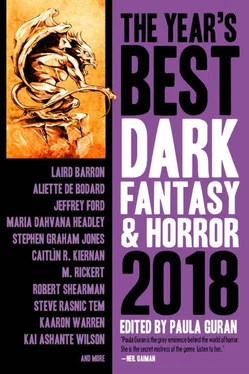Now he’s gone, at last he’s gone. She can put up her hand to her belly, she can stroke it and nuzzle it, and she likes to think how soon—please God, soon—the belly might grow, it’ll warp and distend. She gives her body a playful little shake, and she fancies she can hear new life sloshing around inside. And she listens out to hear what sort of scream will come from Max’s bedroom.
The Long Fade Into Evening
Steve Rasnic Tem
Simon had nowhere to live until his cousin offered him a house in a run-down development on the outer edge of town. All he had to do was stay there to discourage vandalism. The development was almost empty, scheduled to be torn down.
“You’re not suicidal are you?” Will asked as he handed him the key.
“Angela left me years ago. I haven’t been successful in years. Why would I kill myself now ?”
Will, pretending to shuffle papers, didn’t look up. “I know it’s been rough, and you’re not getting any younger. It’s just that a few of the families that are left have kids, teenagers. I’d hate for them to find…”
“Old fellows like me, we don’t have the energy to kill ourselves. We usually just fade away.”
Will stared at him. “I see. Do you need directions?”
“I lived in the neighborhood when I was a kid, in one of those old Victorians before they built this awful thing. Now here it’s a wreck as well.”
“I’ve read about that. There was some trouble wasn’t there? Overcrowding, and some violence? Something about a fire?”
“What didn’t burn they bulldozed. Everybody scattered, went their ways. Now here I am with nowhere else to go.”
“I’ve arranged for someone to drop off a sleeping bag and supplies. I’m working on a bed.”
“I’m deeply grateful,” Simon replied. And he was. He’d just never understood who decided what goes, what stays, and where people got to live.
“By the way, we’ve had a problem with cats. Feral cats, running all over the place. Best not let one of them scratch you.”
Simon examined the keys as if reconsidering. “I hate cats,” he said.
On moving day he rushed to finish his final shift at the corner store and get his belongings—everything stuffed into a cardboard suitcase and a patched laundry bag—from behind the counter to the bus stop. Most of the shelves were empty. As ordered, he kept rearranging what remained from the “Going out of Business” sale for more appeal, while restlessly waiting for his replacement to arrive. Julie, always out on a date with no consideration for anyone. By now he’d lost everything of importance, but at least Simon held on to his manners.
A pack of twittering girls burst through the door and raced each other for the drink machine. He used to tell the teens to slow down but the way even the young ones would turn on you these days he no longer dared. Further evidence of how the new world was eating the old. “The girls are worse than the boys,” someone he worked with once said. The sexism embarrassed him, but he worried it might be true. All he needed was a broken arm, or a deep scratch from a dirty fingernail.
He watched as they poked their phones, took pictures, and mixed different sodas at random into a single cup. Apparently they would share. They all appeared to have too many fingers, different colors on too many nails. The new world was raising them strange. Perhaps if he had a child of his own… but Angela always feared he would drop or lose it.
One caught him staring and flashed her tiny tit. The others screamed madly. He blushed and turned away, looking down at his things. He prayed the gigglers would be gone before he tried to haul it all to the bus stop. He hated when he had to pretend to ignore their catcalls.
His possible future caretakers ran out the door without paying. He was relieved not to have to ring them up. Julie came in after, smiling knowingly and smelling of booze. Simon gathered up his life and stumbled for the door.
The bus contained a few more broken types like him, an older woman in a nice dress, and a figure bundled in its oversized coat. Its head, wrapped in a scarf and topped with a watchman’s cap, appeared too small for its torso. Its eyes were buried. The bus sped down the block passing the girls with their surplus of fingers, their writhing clump of shadow hungry and hideous on the greasy brick wall.
The bus struggled up the hill past bars spilling their last patrons, who hailed and cursed the driver who was too wise to stop. At the peak where the lanes grew wider he sped past abandoned storefronts, lots jammed with ancient equipment, the iron skeletons of dead buildings, the rows of silent warehouses with rusted doors flush to the road. There was the rare bus stop, the random passenger standing with one arm waving, but the driver never slowed. Simon believed this part of the city need never exist.
The route would not take Simon all the way to the development. The bus dropped him at a darkened stop to stand beside a crumbling, heavily graffitied bench. Some words were almost recognizable, but lay obscured beneath mindless exhortation. The ground rose steeply before him, and somewhere beyond that rise of shadow the aging development began. Smoky grayness drifted down from the low clouds and seeped out from the overgrown embankment. The hill’s silhouette was deceptive, suggesting primeval forest more than cultivated landscape.
Instead of taking the road around, he pulled the flashlight from his laundry bag and sought a shorter path. He followed a trail of broken, grass-invaded sidewalk through the unkempt greenbelt and up the hill. He had to struggle through tall-weeded fields, ignoring unidentifiable animal sounds in the underbrush, the occasional glimmer of a red or yellow eye. Man-shaped spaces opened up in the dark vegetation a few feet away, but no one approached. He tried to remember what, if any, of these features had been here when he was a boy. It had been wilderness then, too, although even less controlled. He and his friends would venture there after sunset. He vaguely remembered the darkness, and the dreadful confusion of echo, but nothing else.
He was nerve-exhausted by the time he entered the murky blocks of identical one story ranch houses and sodden lanes of the development. The neighborhood of his youth had been a crowded slum but at least it had some grandeur in its height and architecture. A sea of bright holes identifying downtown shimmered in the distance behind him. Ahead were the squat rectangles of unlit homes, and houses with few lights on, and houses half-gone into ruin, a handful of dried-up gardens and trashed-out back yards, their wire fences plastered in random trash.
In an abandoned playground a shattered teeter-totter sprawled like a sacrifice across its steel pipe center. The swing framework still stood erect but rusted, its seats and slide gone without a trace. So where did the remaining children play, or were they too old for something so innocent? One was crying now, he thought, although it might have been one of those stray cats.
Simon had no way to determine which houses were actually empty, and which were occupied by people who just wanted to keep to themselves. Without knocking on doors, perhaps peeking through windows, which he wasn’t about to do.
In the old days, in that other neighborhood of taller and less uniform homes, he heard a great many things: the voices of friends he hadn’t seen in decades, music playing from a record player in a neighbor’s upstairs window, misunderstood whispers from lovers hiding themselves in the shadowed strips near walls. All of that had been torn down and bull-dozed, the old neighborhood beheaded. It occurred to Simon he now had more memories than life. It was an uncomfortable way to travel.
Читать дальше












